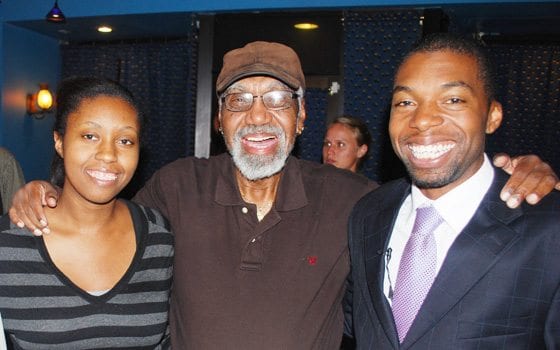

Author: Ernesto ArroyoCarlos Henriquez (far right), candidate for 5th Suffolk State Representative, is all smiles as he celebrates his primary victory at Merengue Restaurant with his sister Sandra Elena Henriquez and father Julio Henriquez.
This year’s Democratic primary injected fresh blood into the state Legislature with the election of Carlos Henriquez and Russell E. Holmes, the first two black men elected to the House from Boston since 1982.
A 33-year-old of both African American and Latino descent, Henriquez is excited about being a role model for the youth in his community, while maintaining the same sense of civic engagement he had throughout the campaign.
“After the election, I was right back out there playing basketball with teens in my neighborhood, letting them know that even thought I am heading to the Statehouse, I will still be right here in the community talking to them and being a leading voice for them on Beacon Hill.”
After two unsuccessful campaigns to unseat Boston City Councilor Chuck Turner, Henriquez said that his message still resonated with the community he grew up in. As a result, he said, he found the courage to run again, this time for the seat left vacant by Marie St. Fleur, the first Haitian-American to serve in the Massachusetts Legislature. She resigned in June to join Mayor Thomas Menino’s administration.
Henriquez prevailed with 719 votes in a hotly contested four-way race in Dorchester’s 5th Suffolk District, defeating second place finisher Barry Lawton by just 41 votes. Two perennial candidates, Althea Garrison, 69, and Roy Owens, 64, also ran.
In the 6th Suffolk District, which covers Mattapan, parts of Dorchester and Hyde Park, Holmes won by a wider margin, beating back second place finisher Karen Payne, a health care consultant and former head of the Boston branch of the NAACP, 910 votes to 622. The other candidates were Darrin Howell, an aide to City Councilor Chuck Turner, Kathy Gabriel and justice of the peace Divo Monteiro.
Holmes is a financial adviser and community activist. He doesn’t have a challenger in the upcoming general election.
Incumbent state Sen. Sonia Chang-Diaz soundly defeated challenger Hassan Williams, garnering 70 percent of the vote in the 2nd Suffolk District.
“I do plan on running again,” said Williams.
Williams plans to return to his law practice, but said he will still work to meet as many people in the district as possible and share his vision of the area with them. “We need to look toward the needs of our district instead of personal needs,” Williams said.
While voting patterns remained divided along the district’s white-black-Latino axis, Chang-Diaz appears to have made inroads into the black community, securing 42.5 percent of the vote in the predominantly African American Ward 12.
The 57.5 percent Williams garnered in Ward 12 was offset by his apparent inability to secure votes in the district’s predominantly white wards. In Ward 19, which includes the wealthier precincts in Jamaica Plain, Williams secured just 8 percent of the vote to Chang- Diaz’s 91.5 percent.
Adding to Chang-Diaz’s margin of victory was higher turnout in the white community. While 1,724 voters cast ballots in Ward 12, 2,553 voted in Ward 19.
Name recognition and the power of incumbency may have worked to Chang-Diaz’s margin of victory. Another factor may have been a gap in campaign strategy. The Chang Diaz campaign used phone banks and door-to-door visits to identify supporters, then targeted those voters with rides to the polls on election day.






